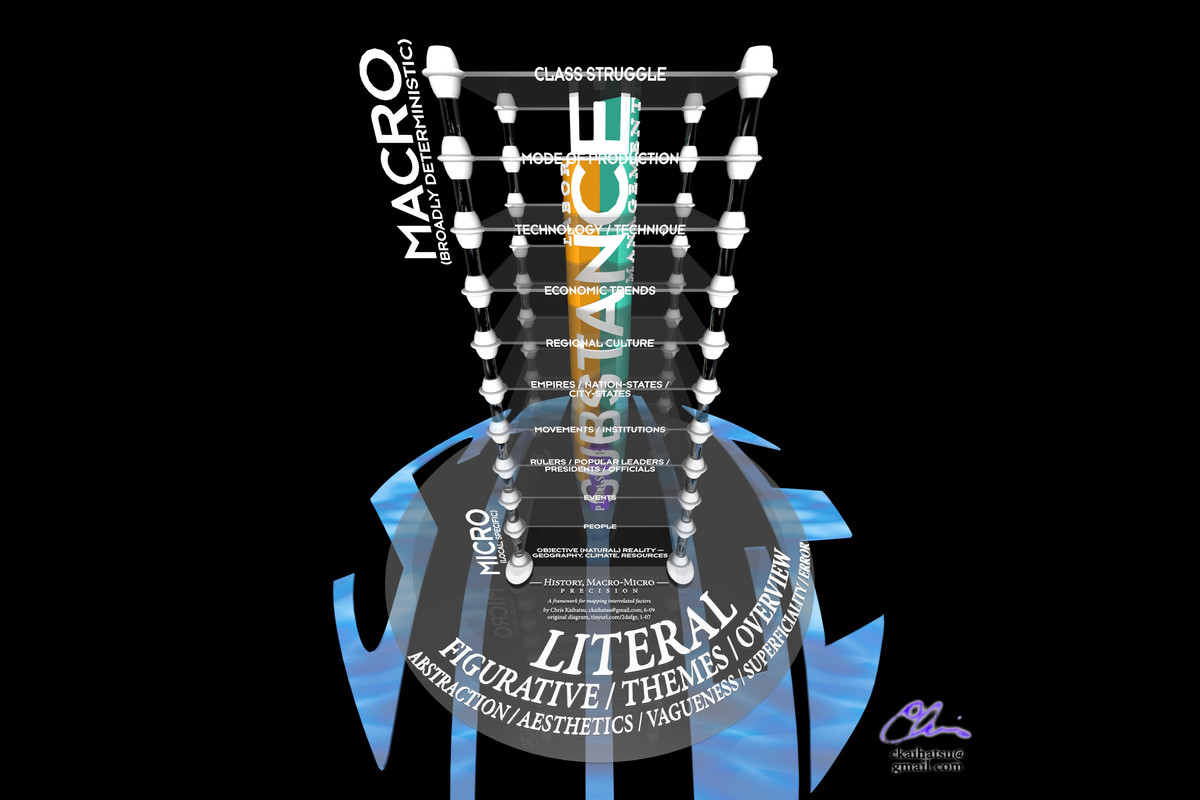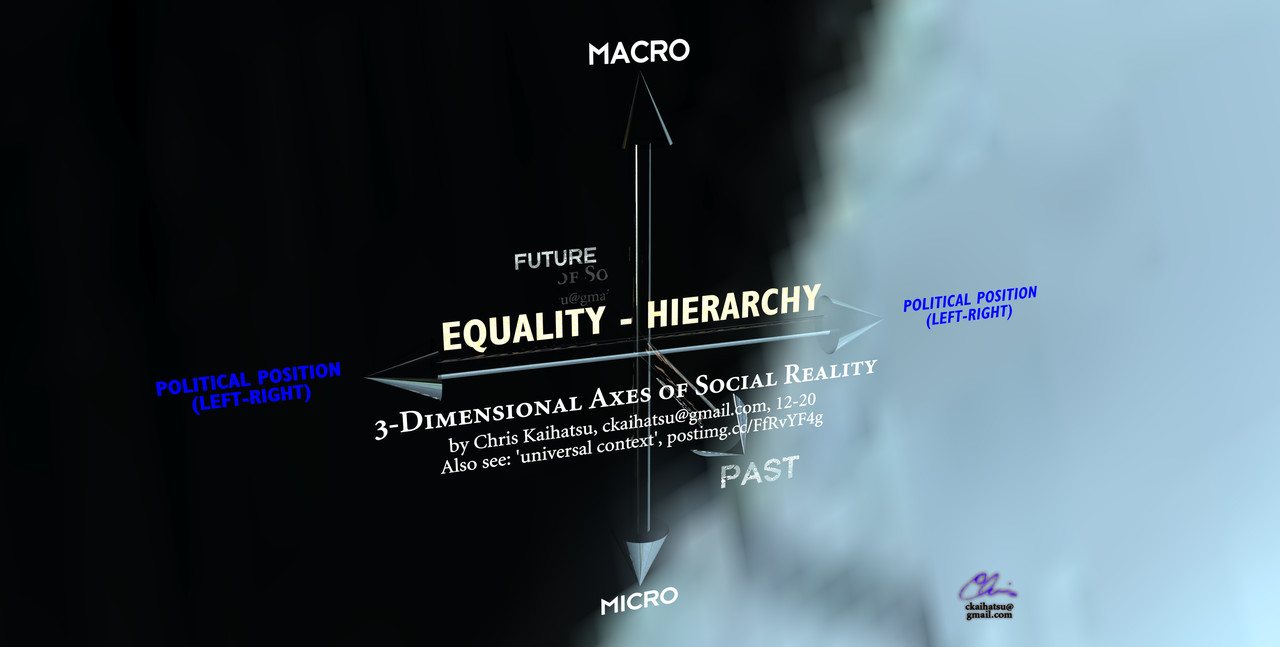- 23 Jun 2021 19:56
#15177936
Where does social change come from? Is it ultimately top down in it's start or bottom-up?
I have the impression that many depict history as the action solely of leaders and people in power or government but seem to foreclose why they would be propelled to act as they did, basically, there is a lack of context. It seems to fragment history where things seem to emerge from nowhere almost. Just, someone had an idea and was in the right position to enact it and make it law. Which also seems to contradict the sense that as influential as the government can be in implementing something, it does not directly control cultural/social change and can be quite facile towards certain things.
My impression is that the view of some town down the implementation of social change simply obscures it's bottom-up basis, where even a representative is a figure among masses of a social movement, a clearly identifiable social subject (not an individual person but a mass organized around a purpose).
https://www.ethicalpolitics.org/ablunden/works/note.htm
[QYOTE]Ad. 1 When I wrote this book I was unaware that there was any academic literature on the topic of the origins of collective decision making, only hearsay among anarchist writers. Subsequently, I learnt that there is an academic literature on Majority voting but I had never come across it because it never went to the places that I explored.
Academic treatment of Majority decision making goes as follows: a description of practices in ancient Greece and the commentary of Plato, Aristotle, etc., skip a couple of centuries to ancient Rome, a quote or two from Pliny or whoever, skip a millennium to decisions of the medieval Vatican, then skip half a millennium to eighteenth century France and the science proper begins with Rousseau, Condorcet, Pufendorf, etc., as well as Englishmen like Hobbes and Locke.
The material about the ancient world is interesting in itself, but I never went there because my real topic was collective decision making practices in the contemporary world and there was no thread of practical collaboration connecting the political practices of the classical world to our own. As is well known, the line of transmission of classical culture to early modern Europe passed through the Islamic world and the sole vehicle was text, not practice, and political practices are not acquired by masses of people reading manuscripts.
But at the time Pufendorf and Condorcet discussed voting, they are reflecting on an established practice, and they have neither the knowledge of nor an interest in the origins of that practice which ordinary people had been engaged in (it turns out) for about 800 years. As a result of adopting these Enlightenment philosophers as the founders of the theory of voting, a belief grew up that voting was invented by philosophers and passed down from the top by governments. Others who believed that the British House of Commons had invented voting arrived at similar conclusions.
But this idea that voting is a gift handed down from the top to the people fundamentally distorts the nature of Majority decision making, which was invented by merchants, artisans and others excluded from the protection of the state under feudal law governed by blood and soil. That is to say, voting was invented by the excluded, at the very bottom and pressed upward until universal suffrage was achieved in the twentieth century.[/QUOTE]
https://www.ethicalpolitics.org/ablunden/pdfs/rawls.pdf
It seems to me that the sentiment that sees the top-down approach to change is conservative at best and reactionary at worst as it seems to think social changes occur not through struggle and fighting, but through benevolence of leaders. Illiberal struggle contradicts the sentiment of consensus or compromise for there is no universal good, only different goals and interests of many. Even while liberalism itself was born from violent means, you see the contradiction of those who speak ill of the revolutionaries who are responsible for it's existence.
I have the impression that many depict history as the action solely of leaders and people in power or government but seem to foreclose why they would be propelled to act as they did, basically, there is a lack of context. It seems to fragment history where things seem to emerge from nowhere almost. Just, someone had an idea and was in the right position to enact it and make it law. Which also seems to contradict the sense that as influential as the government can be in implementing something, it does not directly control cultural/social change and can be quite facile towards certain things.
My impression is that the view of some town down the implementation of social change simply obscures it's bottom-up basis, where even a representative is a figure among masses of a social movement, a clearly identifiable social subject (not an individual person but a mass organized around a purpose).
https://www.ethicalpolitics.org/ablunden/works/note.htm
[QYOTE]Ad. 1 When I wrote this book I was unaware that there was any academic literature on the topic of the origins of collective decision making, only hearsay among anarchist writers. Subsequently, I learnt that there is an academic literature on Majority voting but I had never come across it because it never went to the places that I explored.
Academic treatment of Majority decision making goes as follows: a description of practices in ancient Greece and the commentary of Plato, Aristotle, etc., skip a couple of centuries to ancient Rome, a quote or two from Pliny or whoever, skip a millennium to decisions of the medieval Vatican, then skip half a millennium to eighteenth century France and the science proper begins with Rousseau, Condorcet, Pufendorf, etc., as well as Englishmen like Hobbes and Locke.
The material about the ancient world is interesting in itself, but I never went there because my real topic was collective decision making practices in the contemporary world and there was no thread of practical collaboration connecting the political practices of the classical world to our own. As is well known, the line of transmission of classical culture to early modern Europe passed through the Islamic world and the sole vehicle was text, not practice, and political practices are not acquired by masses of people reading manuscripts.
But at the time Pufendorf and Condorcet discussed voting, they are reflecting on an established practice, and they have neither the knowledge of nor an interest in the origins of that practice which ordinary people had been engaged in (it turns out) for about 800 years. As a result of adopting these Enlightenment philosophers as the founders of the theory of voting, a belief grew up that voting was invented by philosophers and passed down from the top by governments. Others who believed that the British House of Commons had invented voting arrived at similar conclusions.
But this idea that voting is a gift handed down from the top to the people fundamentally distorts the nature of Majority decision making, which was invented by merchants, artisans and others excluded from the protection of the state under feudal law governed by blood and soil. That is to say, voting was invented by the excluded, at the very bottom and pressed upward until universal suffrage was achieved in the twentieth century.[/QUOTE]
https://www.ethicalpolitics.org/ablunden/pdfs/rawls.pdf
Clearly the Abolitionists and Civil Rights activists resorted to illiberal means and Rawls cannot bend his conception of liberalism to include the use of illiberal means ‒ civil war, non-violent resistance, boycotts, intolerance towards slavery and racism ‒ to overthrow the dominant consensus and institutionalise a new conception of Right. Liberalism is simply a description of a mode of compromise within an established way of life. The fact is that a new consensus was not established through reasoned argument; reasoned argument came into play only once the goal posts had already been moved. In our times, dynamic justice is the norm. That is, it is generally recognised that the series of new claims to recognition and established social practices which will be called into question is indefinite. Rawls’ liberalism solves nothing in this respect.
Rawls regards the social life in which such new challenges originate as simply a “background culture.”. But the crises arising in this culture are to be resolved, not within the community where the crises have originated, but in the domain of thought experiments. These thought experiments are a representation of the constitutional, legislative and judicial superstructure characteristic of modern bourgeois nations.
This superstructure is not and has never been the location of struggles to expand the domain of human rights and deepen the conception of good. This social and cultural advance has its origins in resistance and struggle, and its entry into the judicial and legislative domain is only a signal that the struggle has broken through to the extent of challenging for institutionalisation.
...
It would appear that it is reasonable for you to ask me to accept private ownership but unreasonable for me to ask you to accept common ownership. The interests of rich and poor can be mediated in the liberal manner; the poor remain poor and the rich rich of course, but rich and poor can treat each other and free and equal persons and can reach a modus vivendi. Social safety nets, public health and education can all moderate the extremes of capitalism and so long as the liberals can hold sway in the capitalist camp all these things are possible to the extent that those who suffer are prepared to engage in the very illiberal struggle against the ills of capitalism. But that is the point.
Rawls’ political liberalism does not answer any of the substantial questions of justice in bourgeois society; it simply advises that when someone comes forward with a legitimate claim and is capable of bringing its opponents to the negotiating table, then it should be dealt with reasonably.
Once the claim has been institutionalised, then its recognition becomes part of reasonable common sense and public reason. Insofar as Rawls’ political liberalism lacks any substantive content, it is reasonable; in respect of any real problems of justice in the modern world, it has no substantive content.
...all emancipatory struggles are illiberal.
It seems to me that the sentiment that sees the top-down approach to change is conservative at best and reactionary at worst as it seems to think social changes occur not through struggle and fighting, but through benevolence of leaders. Illiberal struggle contradicts the sentiment of consensus or compromise for there is no universal good, only different goals and interests of many. Even while liberalism itself was born from violent means, you see the contradiction of those who speak ill of the revolutionaries who are responsible for it's existence.
https://www.ethicalpolitics.org/ablunden/pdfs/For%20Ethical%20Politics.pdf#page90
-For Ethical Politics
-For Ethical Politics












 - By Fasces
- By Fasces